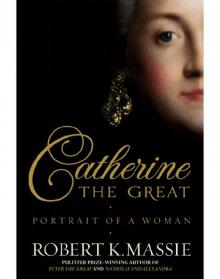- Home
- Robert K. Massie
Catherine the Great
Catherine the Great Read online
Copyright © 2011 by Robert K. Massie
Maps copyright © 2011 by David Lindroth, Inc.
All rights reserved.
Published in the United States by Random House, an imprint of The Random House Publishing Group, a division of Random House, Inc., New York.
RANDOM HOUSE and colophon are registered trademarks of Random House, Inc.
LIBRARY OF CONGRESS CATALOGING-IN-PUBLICATION DATA
Massie, Robert K.
Catherine the Great : portrait of a woman / by Robert K. Massie.
p. cm.
eISBN: 978-1-58836-044-1
1. Catherine II, Empress of Russia, 1729–1796. 2. Empresses—Russia—Biography.
3. Russia—Kings and rulers—Biography. 4. Russia—History—Catherine II,
1762–1796. I. Title.
DK170.M34 2011 2011015279
947′.063092—dc22 [B]
www.atrandom.com
Jacket design: The Book Designers
Jacket painting: Alexei Petrovich Antropov, portrait of Grand Duchess Ekaterina Alekseyevna (the future Catherine the Great) (detail) (Bridgeman Art Library International)
v3.1
Perhaps the best description of her is that she is a woman as well as an empress.
—The Earl of Buckinghamshire,
British ambassador to Russia, 1762–65
CONTENTS
Cover
Title Page
Copyright
Epigraph
Maps
PART I A German Princess
1 Sophia’s Childhood
2 Summoned to Russia
3 Frederick II and the Journey to Russia
4 Empress Elizabeth
5 The Making of a Grand Duke
6 Meeting Elizabeth and Peter
7 Pneumonia
8 Intercepted Letters
9 Conversion and Betrothal
10 A Pilgrimage to Kiev and Transvestite Balls
11 Smallpox
12 Marriage
13 Johanna Goes Home
PART II A Painful Marriage
14 The Zhukova Affair
15 Peepholes
16 A Watchdog
17 “He Was Not a King”
18 In the Bedroom
19 A House Collapses
20 Summer Pleasures
21 Dismissals at Court
22 Moscow and the Country
23 Choglokov Makes an Enemy and Peter Survives a Plot
24 A Bath Before Easter and a Coachman’s Whip
25 Oysters and an Actor
26 Reading, Dancing, and a Betrayal
PART III Seduction Motherhood, and Confrontation
27 Saltykov
28 The Birth of the Heir
29 Retaliation
30 The English Ambassador
31 A Diplomatic Earthquake
32 Poniatowski
33 A Dead Rat, an Absent Lover, and a Risky Proposal
34 Catherine Challenges Brockdorff; She Gives a Party
35 Apraksin’s Retreat
36 Catherine’s Daughter
37 The Fall of Bestuzhev
38 A Gamble
39 Confrontation
40 A Ménage à Quatre
Photo Insert
PART IV “The Time Has Come!”
41 Panin, Orlov, and Elizabeth’s Death
42 The Brief Reign of Peter III
43 “Dura!”
44 “We Ourselves Know Not What We Did”
PART V Empress of Russia
45 Coronation
46 The Government and the Church
47 Serfdom
48 “Madame Orlov Could Never Be Empress of Russia”
49 The Death of Ivan VI
50 Catherine and the Enlightenment
51 The Nakaz
52 “All Free Estates of the Realm”
53 “The King We Have Made”
54 The First Partition of Poland and the First Turkish War
55 Doctors, Smallpox, and Plague
56 The Return of “Peter the Third”
57 The Last Days of the “Marquis de Pugachev”
PART VI Potemkin and Favoritism
58 Vasilchikov
59 Catherine and Potemkin: Passion
60 Potemkin Ascending
61 Catherine and Potemkin: Separation
62 New Relationships
63 Favorites
PART VII “My Name Is Catherine the Second”
64 Catherine, Paul, and Natalia
65 Paul, Maria, and the Succession
66 Potemkin: Builder and Diplomat
67 Crimean Journey and “Potemkin Villages”
68 The Second Turkish War and the Death of Potemkin
69 Art, Architecture, and the Bronze Horseman
70 “They Are Capable of Hanging Their King from a Lamppost!”
71 Dissent in Russia, Final Partition of Poland
72 Twilight
73 The Death of Catherine the Great
Dedication
Acknowledgments
Selected Bibliography
Notes
Other Books by This Author
About the Author
1
Sophia’s Childhood
PRINCE CHRISTIAN AUGUSTUS of Anhalt-Zerbst was hardly distinguishable in the swarm of obscure, penurious noblemen who cluttered the landscape and society of politically fragmented eighteenth-century Germany. Possessed neither of exceptional virtues nor alarming vices, Prince Christian exhibited the solid virtues of his Junker lineage: a stern sense of order, discipline, integrity, thrift, and piety, along with an unshakable lack of interest in gossip, intrigue, literature, and the wider world in general. Born in 1690, he had made a career as a professional soldier in the army of King Frederick William of Prussia. His military service in campaigns against Sweden, France, and Austria was meticulously conscientious, but his exploits on the battlefield were unremarkable, and nothing occurred either to accelerate or retard his career. When peace came, the king, who was once heard to refer to his loyal officer as “that idiot, Zerbst,” gave him command of an infantry regiment garrisoning the port of Stettin, recently acquired from Sweden, on the Baltic coast of Pomerania. There, in 1727, Prince Christian, still a bachelor at thirty-seven, bowed to the pleas of his family and set himself to produce an heir. Wearing his best blue uniform and his shining ceremonial sword, he married fifteen-year-old Princess Johanna Elizabeth of Holstein-Gottorp, whom he scarcely knew. His family, which had arranged the match with hers, was giddy with delight; not only did the line of Anhalt-Zerbst seem assured, but Johanna’s family stood a rung above them on the ladder of rank.
It was a poor match. There were the problems of difference in age; pairing an adolescent girl with a man in middle age usually stems from a confusion of motives and expectations. When Johanna, of a good family with little money, reached adolescence and her parents, without consulting her, arranged a match to a respectable man almost three times her age, Johanna could only consent. Even more unpromising, the characters and temperaments of the two were almost entirely opposite. Christian Augustus was simple, honest, ponderous, reclusive, and thrifty; Johanna Elizabeth was complicated, vivacious, pleasure-loving, and extravagant. She was considered beautiful, and with arched eyebrows, fair, curly hair, charm, and an exuberant eagerness to please, she attracted people easily. In company, she felt a need to captivate, but as she grew older, she tried too hard. In time, other flaws appeared. Too much gay talk revealed her as shallow; when she was thwarted, her charm soured to irritability and her quick temper suddenly exploded. Underlying this behavior, and Johanna had known this from the beginning, was the fact that her marriage had been a terrible—and was now an inescapable—mistake.
> Confirmation first came when she saw the house in Stettin to which her new husband brought her. Johanna had spent her youth in unusually elegant surroundings. Because she was one of twelve children in a family that formed a minor branch of the ducal Holsteins, her father, the Lutheran bishop of Lübeck, had passed her along for upbringing to her godmother, the childless Duchess of Brunswick. Here, in the most sumptuously magnificent court in north Germany, she had become accustomed to a life of beautiful clothes, sophisticated company, balls, operas, concerts, fireworks, hunting parties, and constant, tittering gossip.
Her new husband, Christian Augustus, a career officer existing on his meager army pay, could provide none of this. The best he could manage was a modest gray stone house on a cobbled street constantly swept by wind and rain. The walled fortress town of Stettin, overlooking a bleak northern sea and dominated by a rigid military atmosphere, was not a place where gaiety, graciousness, or any of the social refinements could flourish. Garrison wives led dull lives; the lives of the wives of the town were duller still. And here, a lively young woman, fresh from the luxury and distractions of the court of Brunswick, was asked to exist on a tiny income with a puritanical husband who was devoted to soldiering, addicted to rigid economy, equipped to give orders but not to converse, and eager to see his wife succeed in the enterprise for which he had married her: the bearing of an heir. In this endeavor, Johanna did her best—she was a dutiful if unhappy wife. But always, underneath, she yearned to be free: free of her boring husband, free of their relative penury, free of the narrow, provincial world of Stettin. Always, she was certain that she deserved something better. And then, eighteen months after her marriage, she had a baby.
Johanna, at sixteen, was unprepared for the realities of motherhood. She had dealt with her pregnancy by wrapping herself in dreams: that her children would grow into extensions of herself and that their lives eventually would supply the broad avenue on which she would travel to achieve her own ambitions. In these dreams, she took it for granted that the baby she was carrying—her firstborn—would be a son, an heir for his father, but more important a handsome and exceptional boy whose brilliant career she would guide and ultimately share.
At 2:30 a.m. on April 21, 1729, in the chill, gray atmosphere of a Baltic dawn, Johanna’s child was born. Alas, the little person was a daughter. Johanna and a more accepting Christian Augustus managed to give the baby a name, Sophia Augusta Fredericka, but from the beginning, Johanna could not find or express any maternal feeling. She did not nurse or caress her little daughter; she spent no time watching over her cradle or holding her; instead, abruptly, she handed the child over to servants and wet nurses.
One explanation may be that the process of childbirth nearly cost Johanna her life; for nineteen weeks after Sophia was born, the adolescent mother remained confined to her bed. A second is that Johanna was still very young and her own bright ambitions in life were far from fulfilled. But the stark, underlying reason was that her child was a girl, not a boy. Ironically, although she could not know it then, the birth of this daughter was the crowning achievement of Johanna’s life. Had the baby been the son she so passionately desired, and had he lived to adulthood, he would have succeeded his father as Prince of Anhalt-Zerbst. Then the history of Russia would have been different and the small niche in history that Johanna Elizabeth earned for herself never would have existed.
Eighteen months after the birth of her first child, Johanna gave birth to the son upon whom she had set her heart. Her fondness for this second infant, Wilhelm Christian, became all the more intense when she realized that something about the child was seriously wrong. The boy, who appeared to suffer from rickets, became her obsession; she petted him, spoiled him, and scarcely let him out of her sight, lavishing on him all the affection she had denied her daughter. Sophia, already keenly aware that her own birth had been a disappointment to her mother, now observed the love with which Johanna surrounded her little brother. Gentle kisses, whispered endearments, tender caresses all were bestowed on the boy—while Sophia watched. It is, of course, common for the mother of a handicapped or chronically ill child to spend more time with that child, just as it is normal for other children in the family to resent this disproportionate attention. But Johanna’s rejection of Sophia began before Wilhelm’s birth, and then continued in aggravated form. The result of this maternal favoritism was a permanent wound. Most children, rejected or neglected in favor of a sibling, react more or less as Sophia did: to avoid more hurt, she sealed off her emotions; nothing was being given her and nothing was expected. Little Wilhelm, who simply accepted his mother’s affection as normal, was quite innocent of any wrongdoing; even so, Sophia hated him. Forty years later, writing her Memoirs, her resentments still simmered:
It was told me that I was not very joyfully welcomed.… My father thought I was an angel; my mother did not pay much attention to me. A year and a half later, she [Johanna] gave birth to a son whom she idolized. I was merely tolerated and often I was scolded with a violence and anger I did not deserve. I felt this without being perfectly clear why in my mind.
Thereafter, Wilhelm Christian goes unmentioned in her Memoirs until his death in 1742 at the age of twelve. Then, her brief account is unemotionally clinical:
He lived to be only twelve and died of spotted [scarlet] fever. It was not until after his death that they learned the cause of an illness which had compelled him to walk always with crutches and for which remedies had been constantly given him in vain and the most famous physicians in Germany consulted. They advised that he be sent to baths at Baden and Karlsbad, but he came home each time as lame as before he went away and his leg became smaller in proportion as he grew taller. After his death, his body was dissected and it was found that his hip was dislocated and must have been so from infancy.… At his death, my mother was inconsolable and the presence of the entire family was necessary to help her bear her grief.
This bitterness only hints at Sophia’s enormous resentment against her mother. The harm done to this small daughter by Johanna’s open display of preference marked Sophia’s character profoundly. Her rejection as a child helps to explain her constant search as a woman for what she had missed. Even as Empress Catherine, at the height of her autocratic power, she wished not only to be admired for her extraordinary mind and obeyed as an empress, but also to find the elemental creature warmth that her brother—but not she—had been given by her mother.
Even minor eighteenth-century princely families maintained the trappings of rank. Children of the nobility were provided with nurses, governesses, tutors, instructors in music, dancing, riding, and religion to drill them in the protocol, manners, and beliefs of European courts. Etiquette was foremost; the little students practiced bowing and curtseying hundreds of times until perfection was automatic. Language lessons were paramount. Young princes and princesses had to be able to speak and write in French, the language of the European intelligentsia; in aristocratic German families, the German language was regarded as vulgar.
The influence of her governess, Elizabeth (Babet) Cardel, was critical at this time in Sophia’s life. Babet, a Huguenot Frenchwoman who found Protestant Germany safer and more congenial than Catholic France, was entrusted with overseeing Sophia’s education. Babet quickly understood that her pupil’s frequent belligerence arose out of loneliness and a craving for encouragement and warmth. Babet provided these things. She also began to give Sophia what became her permanent love of the French language, with all its possibilities for logic, subtlety, wit, and liveliness in writing and conversation. Lessons began with Les Fables de La Fontaine; then they moved on to Corneille, Racine, and Molière. Too much of her education, Sophia decided later, had been sheer memorization: “Very early it was noticed that I had a good memory; therefore I was incessantly tormented with learning everything by heart. I still possess a German Bible in which all the verses I had to memorize are underlined with red ink.”
Babet’s approach to teaching was gentle compa
red to that of Pastor Wagner, a pedantic army chaplain chosen by Sophia’s fervently Lutheran father to instruct his daughter in religion, geography, and history. Wagner’s rigid methodology—memorize and repeat—made little headway against a pupil whom Babet had already described as an esprit gauche and who asked embarrassing questions: Why were great men of antiquity such as Marcus Aurelius eternally damned because they had not known of Christ’s salvation and therefore could not have been redeemed? Wagner replied that this was God’s will. What was the nature of the universe before the Creation? Wagner replied that it had been in a state of chaos. Sophia asked for a description of this original chaos; Wagner had none. The word “circumcision” used by Wagner naturally triggered the question: What does that mean? Wagner, appalled at the position in which he found himself, refused to answer. By elaborating on the horrors of the Last Judgment and the difficulty of being saved, Wagner so frightened his pupil that “every night at dusk I would go and cry by the window.” The next day, however, she retaliated: How can the infinite goodness of God be reconciled with the terrors of the Last Judgment? Wagner, shouting that there were no rational answers to such questions, and that what he told her must be accepted on faith, threatened his pupil with his cane. Babet intervened. Later Sophia wrote, “I am convinced in my inmost soul that Herr Wagner was a blockhead.” She added, “All my life I have had this inclination to yield only to gentleness and reason—and to resist all pressure.”

 Peter the Great
Peter the Great Catherine the Great
Catherine the Great Dreadnought
Dreadnought Nicholas and Alexandra: The Classic Account of the Fall of the Romanov Dynasty
Nicholas and Alexandra: The Classic Account of the Fall of the Romanov Dynasty Castles of Steel
Castles of Steel Nicholas and Alexandra: The Tragic, Compelling Story of the Last Tsar and his Family
Nicholas and Alexandra: The Tragic, Compelling Story of the Last Tsar and his Family The Romanovs
The Romanovs Dreadnought, Britain, Germany and the Coming of the Great War
Dreadnought, Britain, Germany and the Coming of the Great War Nicholas and Alexandra
Nicholas and Alexandra